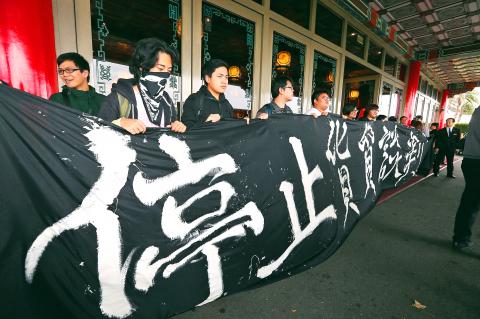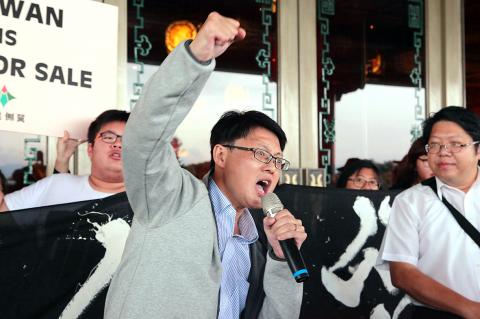The trade in goods agreement being negotiated with China would benefit large corporations at the expense of farmers and small businesses, civic activists said yesterday, calling for talks to be halted.
About 20 protesters from 10 different civic groups gathered outside the entrance of Taipei’s Grand Hotel, lining up behind a long black banner condemning the talks. The hotel is the site for the latest round of talks, which began yesterday and are scheduled to conclude tomorrow.
Protesters shouted a series of slogans demanding that government negotiators not concede the interests of farmers and workers, shouting that negotiations should be halted until there was “democratic participation” and “civic unity.”

Photo: CNA
Economic Democracy Union convener Lai Chung-chiang (賴中強) said that based on the government’s negotiating objectives, large corporations controlling the petrochemical, flat-panel display and automotive industries would be the major domestic beneficiaries of any agreement. Any Chinese concessions to the industries would be linked to opening up thousands of new product categories to Chinese imports, he said.
“The Ministry of Economic Affairs has stated that Taiwan would benefit disproportionally if tariff rates fall to zero, because China’s rates are higher than ours. What they do not say is that what China really cares about is the 22 percent of products for which we ban Chinese imports. China has not dared to sue us in the WTO because such a suit would represent a recognition of our sovereignty, but they are now trying to use the trade in goods talks to bring about the ‘normalization’ of trade,” he said.
The impact of “opening the door” would be “huge,” he said, potentially affecting processed agricultural goods, as well as the steel, textiles, electronics, electronic cabling, glass, ceramics and rubber industries.

Screen grab from Radical Flank website
“These are all tied closely with people’s livelihoods and any imports would harm grassroots labor, but the government has not let the public know the truth, much less given them the opportunity to influence the negotiations,” he said.
He said a mechanism should be established to allow small businesses to have the same access to government negotiators as large corporations, adding that any industries which benefit from a deal should be required to pay extra taxes to fund the “transition” of other industries.
“Taiwan is already reliant on China for more than 40 percent of its trade — which is ‘out of whack’ because we have basically put all of our eggs in a Chinese basket,” Radical Flank convener Chen Yi-chi (陳弈齊) said. “Given this, why in the world do we need to conduct further negotiations on trade in goods or services?”
“Pushing to open markets is not an economic policy program or industrial development program,” he said, adding that increasing the competitiveness of domestic products should take priority over efforts to cut trade barriers.
Meanwhile, about eight protesters from the Taiwan Solidary Union Youth Corps were escorted out of the Grand Hotel’s lobby by police after they charged in to protest the talks, yelling that the agricultural sector had to be protected from a clandestine trade in goods agreement.
Department of Youth Affairs director Chang Chao-lin (張兆林) said the government was playing “word games” with claims that it would not open the agricultural sector.
Restrictions on processed agricultural goods would likely be dropped, hurting farmers interests, he said.

The CIA has a message for Chinese government officials worried about their place in Chinese President Xi Jinping’s (習近平) government: Come work with us. The agency released two Mandarin-language videos on social media on Thursday inviting disgruntled officials to contact the CIA. The recruitment videos posted on YouTube and X racked up more than 5 million views combined in their first day. The outreach comes as CIA Director John Ratcliffe has vowed to boost the agency’s use of intelligence from human sources and its focus on China, which has recently targeted US officials with its own espionage operations. The videos are “aimed at

STEADFAST FRIEND: The bills encourage increased Taiwan-US engagement and address China’s distortion of UN Resolution 2758 to isolate Taiwan internationally The Presidential Office yesterday thanked the US House of Representatives for unanimously passing two Taiwan-related bills highlighting its solid support for Taiwan’s democracy and global participation, and for deepening bilateral relations. One of the bills, the Taiwan Assurance Implementation Act, requires the US Department of State to periodically review its guidelines for engagement with Taiwan, and report to the US Congress on the guidelines and plans to lift self-imposed limitations on US-Taiwan engagement. The other bill is the Taiwan International Solidarity Act, which clarifies that UN Resolution 2758 does not address the issue of the representation of Taiwan or its people in

US Indo-Pacific Commander Admiral Samuel Paparo on Friday expressed concern over the rate at which China is diversifying its military exercises, the Financial Times (FT) reported on Saturday. “The rates of change on the depth and breadth of their exercises is the one non-linear effect that I’ve seen in the last year that wakes me up at night or keeps me up at night,” Paparo was quoted by FT as saying while attending the annual Sedona Forum at the McCain Institute in Arizona. Paparo also expressed concern over the speed with which China was expanding its military. While the US

SHIFT: Taiwan’s better-than-expected first-quarter GDP and signs of weakness in the US have driven global capital back to emerging markets, the central bank head said The central bank yesterday blamed market speculation for the steep rise in the local currency, and urged exporters and financial institutions to stay calm and stop panic sell-offs to avoid hurting their own profitability. The nation’s top monetary policymaker said that it would step in, if necessary, to maintain order and stability in the foreign exchange market. The remarks came as the NT dollar yesterday closed up NT$0.919 to NT$30.145 against the US dollar in Taipei trading, after rising as high as NT$29.59 in intraday trading. The local currency has surged 5.85 percent against the greenback over the past two sessions, central